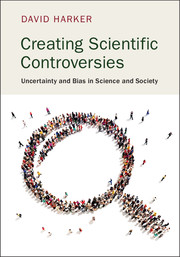Book contents
- Frontmatter
- Dedication
- Contents
- Preface
- Introduction: scientific authority and the created controversy
- Part I Lessons from the Philosophy of Science
- 1 Defining science and the empiricist approach
- 2 Two challenges for the naïve empiricist
- 3 A revolution in how we think about sciences
- 4 Sciences as historically and socially situated
- Points to remember: Part I
- Part II Biases, Arguments and Created Controversies
- Part III Exposing Created Controversies
- Concluding remarks
- References
- Index
4 - Sciences as historically and socially situated
from Part I - Lessons from the Philosophy of Science
Published online by Cambridge University Press: 05 October 2015
- Frontmatter
- Dedication
- Contents
- Preface
- Introduction: scientific authority and the created controversy
- Part I Lessons from the Philosophy of Science
- 1 Defining science and the empiricist approach
- 2 Two challenges for the naïve empiricist
- 3 A revolution in how we think about sciences
- 4 Sciences as historically and socially situated
- Points to remember: Part I
- Part II Biases, Arguments and Created Controversies
- Part III Exposing Created Controversies
- Concluding remarks
- References
- Index
Summary
One of Kuhn's greatest influences on the philosophy of science – an influence quite independent of the merits of his own theory of science – was his use of historical and sociological considerations for purposes of addressing traditional, philosophical questions. Kuhn wasn't the first to think about either the history or sociology of science, but these were nascent disciplines, and their relevance to philosophy was largely ignored. Over the last few decades, the history and sociology of the sciences have each flourished as academic subjects. Simultaneously, philosophy of science has become far more sensitive to the possibility that understanding the sciences requires paying attention to their histories, social contexts, the psychology of working scientists and the social organization of scientific communities. To a significant degree the sciences are now recognized as responses to changing human and social interests, pursued by people of varying personality, celebrity, socio-economic upbringing, race and gender, who work within scientific communities that compete for funding and influence, which generate conclusions that may be unpalatable or inconvenient to certain groups in society. A theory of the sciences that regards them as simply an abstract set of methods and assumptions can produce, at best, an impoverished account.
There is undoubtedly much we can all learn from historical, sociological and psychological perspectives on the sciences, but such perspectives are also often associated with radical and profound challenges to our understanding of what the sciences can achieve. These sceptical arguments threaten scientific authority and the idea that sciences represent our most reliable methods for understanding the world. In this chapter, we'll introduce the arguments. We'll see that their significance for evaluating created controversies is not straightforward. Those who create controversies are typically more concerned with securing for themselves a degree of scientific legitimacy, an objective which isn't well served by arguments that challenge the possibility of scientific authority. Nevertheless, certain critics of mainstream sciences continue to advance versions of these sceptical arguments, and thus it is beneficial to spend some time reviewing them. Towards the end of the chapter, we will survey several further projects that take very seriously the idea that sciences are historically situated, social activities. In some cases, these accounts recognize ways in which sciences can be improved, but they maintain a generally optimistic view of scientific success and the possibility of achieving scientific progress.
- Type
- Chapter
- Information
- Creating Scientific ControversiesUncertainty and Bias in Science and Society, pp. 80 - 105Publisher: Cambridge University PressPrint publication year: 2015



